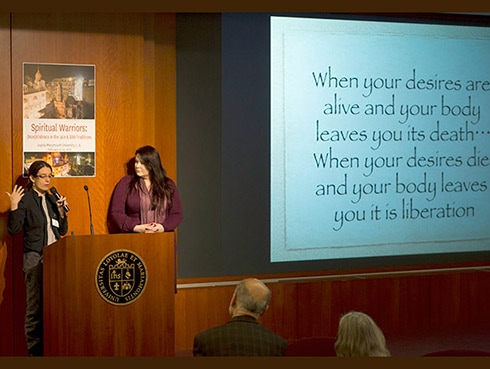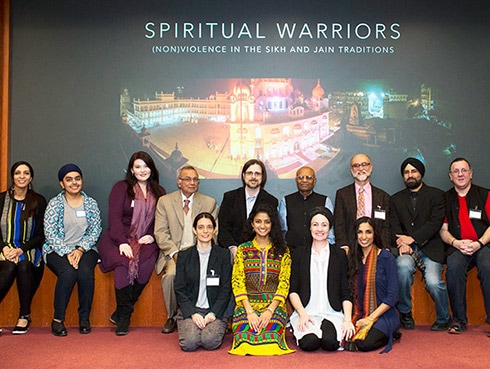
BY DEVIKA C.MEHTA
LOS ANGELES, CA - India’s two most prominent religions, Jainism and Sikhism, came together under one roof at the Loyola Marymount University here on February 23 and 24. The conference was the first ever combined Jain and Sikh Studies program and once again brought together Dr. Sulekh Jain and Dr. Harvinder Singh Sahota,
LOS ANGELES, CA - India’s two most prominent religions, Jainism and Sikhism, came together under one roof at the Loyola Marymount University here on February 23 and 24. The conference was the first ever combined Jain and Sikh Studies program and once again brought together Dr. Sulekh Jain and Dr. Harvinder Singh Sahota,
who share a unique perspective of interreligious understanding in wake of their personal friendship and dedication to highlight under-represented traditions. Two beliefs- ‘The service of faith and promotion of justice’- were paramount at the event by potential philosophers and professors from key universities in the US. Several speakers joined hands to propagate the concept of ‘Spiritual Warriors: (Non) Violence in the Sikh and Jain Traditions’ at the conference that was organized by Nirinjan Kaur Khalsa, Clinical Professor of Jain and Sikh Studies at LMU.
Speaking at the occasion, Khalsa built a bridge between ‘A Jain pacifist and Sikh warrior’ by saying, “Both start with internal conquering of desires and the passions while recognizing the need to care for others because we are all interconnected. It is a mental battle – to be proactive instead of afraid – not allowing emotions to rule. This is what we need to do- to not vilify the other, but to act with compassion, grace, dignity, and understanding, even in the face of hostility and adversity. In other words – both violence and nonviolence begin within our own selves – in our thought, speech, and action.”
And the best way to leave a mark is “To view our own perceptions with our own lenses thus having a control over our selfish desires that build walls between you and me, and separate us from our humanity.”
Adding to her remarks, Arvindpal Singh Mandair from the University of Michigan threw light on Sikhism’s non violent war machine and focused on ‘how martialization of the Sikh tradition has deviated from the earlier Sikh versions’. He further mentioned, “There is a need to re-read the original sources to differentiate between the two types of violence – ego violence and non-ego violence.”
Raising some feminist issues, Anneeth Kaur Hundle from the University of California, Merced spoke about the role and work that needs to be done in the Sikh community. She questioned, “How will we survive as a community, let alone flourish, without the renaissance and resurgence of Sikh feminist thought, theory and praxis? The mask of liberal civility is being taken off now with the rise of new fascism. Women of color need to engage together. That is how we will rise!”
Meanwhile, spiritual warrior Tavleen Kaur raised an important concern following recent hate crimes that are lurking in the corners of American streets by stating, “Problem in the US is that people can’t identify between ‘brown varieties’. TV vitriol leads to vandalism in gurdwaras and the state legitimizes it by calling it ‘hate crimes’. It excuses the state that enables it.” Her statement in wake of the recent fatal shooting of Indian_ American techie Srinivas Kuchibhotla in Kansas, did gather some strong opinion.
The notion was somewhat shared with a different angle by Valarie Kaur, who is a civil rights advocate, and interfaith leader centering her work around the power of storytelling. Also, an award-winning filmmaker, Kaur made her presence felt with her lecture on “Revolutionary Love in an Era of Enormous Rage”. She asked three questions- Who are you? What is at stake for you? What is my role in your flourishing and yours in mine?
Her lines echoed in the auditorium- “Revolutionary is the ability to transform, an internal transformation, an interpersonal transformation and a social transformation. It is a secular ethic inspired by faith traditions. Love for our opponents is the most difficult. Forgiveness is not forgetting, forgiveness is freedom from hate. Maybe this is not the darkness of the tomb but the darkness of the womb, of a nation waiting to be reborn. This is it’s great transition. First we need to breath and then push.” Others in the fray to present their dialogs were Harleen Kaur, Whitny Braun, Steven M. Vose, Margaret M. Gower, Ana Fumes and Jeffery Long, to name a few. Besides lectures, the “Spiritual Warriors” library exhibit in the William H. Hannon Library at LMU, also garnered enthusiasts who watched the showcase of weapons and musical instruments of Sikh spiritual warriors and tools of non-violence used by Jain monks and nuns such as their brooms, scriptures, vows and ascetic robes. Following the success of the event, on Feb 23 a historic first ever meeting of Sikh American women was also held on Campus on Feb 24, who came together to support one another in current political climate, where hate crimes against Sikhs and others continue to rise. This was organized by Nirinjan Khalsa along with Valarie Kaur’s ‘The Revolutionary Love Project’ through USC, Auburn Seminary in NYC and the Sikh Coalition.
Speaking at the occasion, Khalsa built a bridge between ‘A Jain pacifist and Sikh warrior’ by saying, “Both start with internal conquering of desires and the passions while recognizing the need to care for others because we are all interconnected. It is a mental battle – to be proactive instead of afraid – not allowing emotions to rule. This is what we need to do- to not vilify the other, but to act with compassion, grace, dignity, and understanding, even in the face of hostility and adversity. In other words – both violence and nonviolence begin within our own selves – in our thought, speech, and action.”
And the best way to leave a mark is “To view our own perceptions with our own lenses thus having a control over our selfish desires that build walls between you and me, and separate us from our humanity.”
Adding to her remarks, Arvindpal Singh Mandair from the University of Michigan threw light on Sikhism’s non violent war machine and focused on ‘how martialization of the Sikh tradition has deviated from the earlier Sikh versions’. He further mentioned, “There is a need to re-read the original sources to differentiate between the two types of violence – ego violence and non-ego violence.”
Raising some feminist issues, Anneeth Kaur Hundle from the University of California, Merced spoke about the role and work that needs to be done in the Sikh community. She questioned, “How will we survive as a community, let alone flourish, without the renaissance and resurgence of Sikh feminist thought, theory and praxis? The mask of liberal civility is being taken off now with the rise of new fascism. Women of color need to engage together. That is how we will rise!”
Meanwhile, spiritual warrior Tavleen Kaur raised an important concern following recent hate crimes that are lurking in the corners of American streets by stating, “Problem in the US is that people can’t identify between ‘brown varieties’. TV vitriol leads to vandalism in gurdwaras and the state legitimizes it by calling it ‘hate crimes’. It excuses the state that enables it.” Her statement in wake of the recent fatal shooting of Indian_ American techie Srinivas Kuchibhotla in Kansas, did gather some strong opinion.
The notion was somewhat shared with a different angle by Valarie Kaur, who is a civil rights advocate, and interfaith leader centering her work around the power of storytelling. Also, an award-winning filmmaker, Kaur made her presence felt with her lecture on “Revolutionary Love in an Era of Enormous Rage”. She asked three questions- Who are you? What is at stake for you? What is my role in your flourishing and yours in mine?
Her lines echoed in the auditorium- “Revolutionary is the ability to transform, an internal transformation, an interpersonal transformation and a social transformation. It is a secular ethic inspired by faith traditions. Love for our opponents is the most difficult. Forgiveness is not forgetting, forgiveness is freedom from hate. Maybe this is not the darkness of the tomb but the darkness of the womb, of a nation waiting to be reborn. This is it’s great transition. First we need to breath and then push.” Others in the fray to present their dialogs were Harleen Kaur, Whitny Braun, Steven M. Vose, Margaret M. Gower, Ana Fumes and Jeffery Long, to name a few. Besides lectures, the “Spiritual Warriors” library exhibit in the William H. Hannon Library at LMU, also garnered enthusiasts who watched the showcase of weapons and musical instruments of Sikh spiritual warriors and tools of non-violence used by Jain monks and nuns such as their brooms, scriptures, vows and ascetic robes. Following the success of the event, on Feb 23 a historic first ever meeting of Sikh American women was also held on Campus on Feb 24, who came together to support one another in current political climate, where hate crimes against Sikhs and others continue to rise. This was organized by Nirinjan Khalsa along with Valarie Kaur’s ‘The Revolutionary Love Project’ through USC, Auburn Seminary in NYC and the Sikh Coalition.



 RSS Feed
RSS Feed
